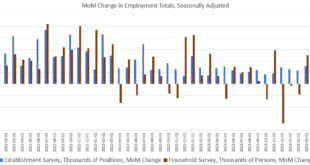According to a new report from the federal government’s Bureau of Labor Statistics on Friday, the US economy added 272,000 jobs during May while the unemployment rate rose slightly to 4.0 percent. As has been repeatedly the case over the past year, the latest monthly job-growth number was described as a “blowout” or “hot” number by major media outlets like CNN. As is typical in the good-news-is-bad-news view on Wall Street, the Dow fell on Friday out of fear that the...
Read More »What Causes Stagflation?
In the late 1960s Edmund Phelps and Milton Friedman challenged the popular view that there can be a sustainable trade-off between inflation and unemployment. In fact, over time, according to PF, loose central bank policies set the platform for lower economic growth and a higher rate of inflation, or stagflation.PF’s Explanation of StagflationStarting from a situation of equality between the current and the expected rate of inflation, the central bank decides to boost...
Read More »Bureaucracy: The Red Tape that Prevents Economic Growth
Javier Milei’s chainsaw policy has been without a doubt one of the most interesting and important topics of discussion in world politics. Argentina has taken important measures since Milei assumed the presidency to revert the tragic economic situation that the country was facing. Perhaps one of the most important measures is the adjustments and cuts in the state, the colloquially called “chainsaw policy.”Two months after Milei assumed the presidency, nine thousand...
Read More »Socialism’s Very Quiet Revolution
In his 1949 book The Road Ahead: America’s Creeping Revolution, John T. Flynn warns about the “great tides of thought and appetite that run unseen deeply below the surface of society.” These unseen tides are political waves that shape the law and institutional policy, but because they are unseen, there is no widespread awareness of the danger they pose. They are barely debated in academic or policy circles. They are treated as an uncontroversial aspect of the...
Read More »The Achilles Heel of the Fiat Money System
The fiat money system will not disappear just like that. Any expectations or hopes to that end should be tempered. Yes, the fiat money system could collapse; yet there is a significant likelihood it will persist longer than most people might think. This prolonged existence may come at a cost: a fascist state encroachment on the freedoms of citizens and entrepreneurs would be more profound than most people realize.Much ink has been spilt about the impending collapse...
Read More »Oil Prices Show Weakening Demand, but Not Because of Electric Cars
The latest OPEC meeting conclusions show that the global economy is not as strong as headlines suggest and that industries all over the world are struggling to recover. Indeed, many manufacturing PMIs (purchasing managers’ indexes) continue to signal contraction.Oil prices have weakened in recent weeks despite the war in Gaza and rising geopolitical risk. At the close of this article, Brent is trading at $81.62 per barrel and WTI at $76.99. This is a mere 7% rise...
Read More »Robert Reich’s Second Myth
Robert Reich’s second myth is “Government Obstructs the Free Market.” (See my response to his first myth here.) He says that what we call the “free market” can only exist with a government enforcing rules about property, monopoly, contracts, and bankruptcy. Reich makes the case that big corporations and the super-wealthy have steered the government’s rules and their enforcement for their own benefit.He’s right, except for the bit about government as a necessary...
Read More »The Unsustainable AI-Driven Lending Boom
For lending, as in all things, necessity is the mother of invention. No matter the rate, lenders want to lend and borrowers want to borrow, with both sides tending to overdo it. The Wall Street Journal reports that the newest collateral thing is the AI chip. Wall Street heavyweight Blackstone led a $7.5 billion financing last week for CoreWeave, “a New Jersey–based startup that owns artificial-intelligence chips and associated computing gear in data centers.”The...
Read More »Is the Dollar the Global Reserve Currency Because There Is No Better Alternative?
What is the Mises Institute? The Mises Institute is a non-profit organization that exists to promote teaching and research in the Austrian School of economics, individual freedom, honest history, and international peace, in the tradition of Ludwig von Mises and Murray N. Rothbard. Non-political, non-partisan, and non-PC, we advocate a radical shift in the intellectual climate, away from statism and toward a private property order....
Read More »We Can Praise Milei’s Policies without Praising the Man
When it comes to political battles and controversies there is, unfortunately, a deeply-seated human tendency to emotionally attach one’s self to political leaders and candidates, rather than to principles or policies. This tendency is especially foundational to modern democratic politics in which voters are encouraged to embrace candidates on an emotional level. Once this occurs, the specifics of a candidate’s positions and principles become secondary to the...
Read More » Swiss Economicblogs.org
Swiss Economicblogs.org

